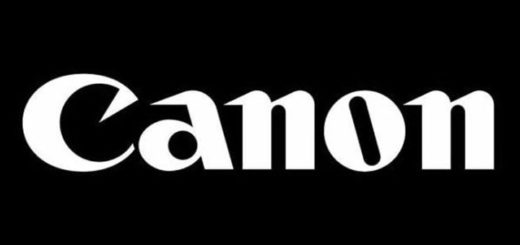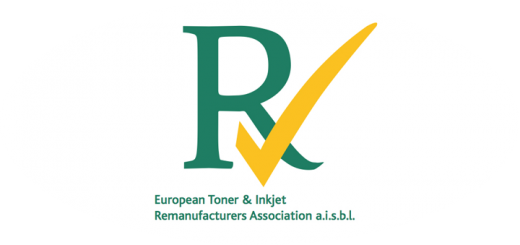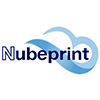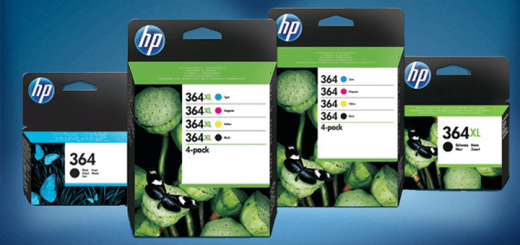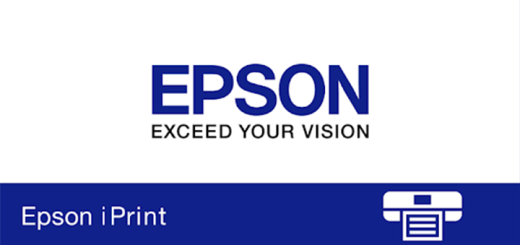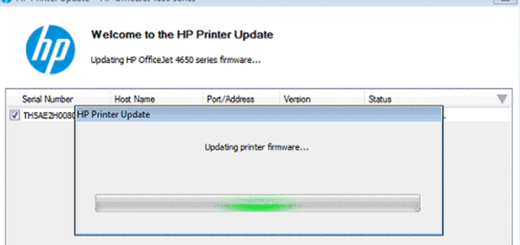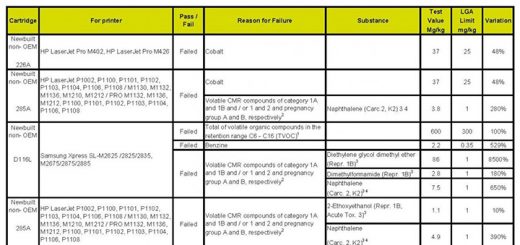HP Releases New Round of Diabolical Firmware Updates
Last week, HP released a new firmware package that once again targets – and potentially locks out—aftermarket environmentally-friendly remanufactured cartridges. The printer will not print and displays the error message, “Indicated cartridges blocked for containing a non-HP chip. Event Code: 10.00.46.”
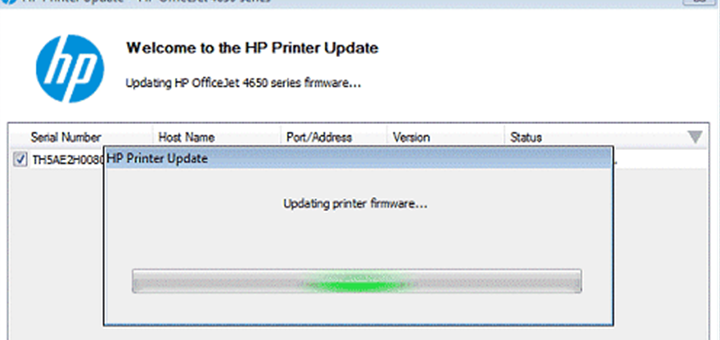
The firmware affects the following printers:
- HP LaserJet Pro M404DN, M404DW, M404N
- HP LaserJet Pro MFP M428DW, M428FDN, M428FDW
- HP LaserJet Enterprise M406DN
- HP LaserJet Enterprise MFP M430F
These updates are infuriating consumers, particularly because they occur automatically and without warning. They cannot be reversed, and render full cartridges useless. Some printers, however can be reset so automatic updates can be turned off (see below). We encourage you to follow these steps, as your printer will perform just fine without these updates.
Class action lawsuits have been initiated over the firmware and are pending. We recently reported on the experience of one auto industry reman executive who encountered the firmware lockout and was forced to throw away five perfectly good cartridges (see https://i-itc.org/the-day-from-hp-hell/).
Environmentally-friendly remanufactured cartridges are one of the targets of HP’s firmware wrath. These cartridges are original cartridges that are scientifically remanufactured and restored to their original condition. For 30 years, remanufactured cartridges have been embraced by consumers and business customers for their better priced and lower impact on the environment.
HP doesn’t like the competition, and they don’t mind irritating their customers to force them into buying new cartridges with these lockout chips and updates. Modern chip technology is a miracle that allows consumers to enjoy a host of features from their machines. Manufacturers use it to monitor their products’ performance and make improvement in subsequent generations.
However, chip technology can also be abused. When chips are used to monitor supply usage in printers, for example, they can become an impediment to product performance. In 1999, the first “killer” chip was introduced. Ever since, they have been used auspiciously to “authenticate” cartridges. Original Equipment manufacturers like HP use them to scare customers into believing that, but for their “authentication chips” malware could get into the customer’s computer through the printer, but that is just not true. The authentication process is truly a way to keep non-OEM supplies from working well…or at all.
Recent chip supply issues have laid bare the truth of the OEM’s deception about chips being essential to the printer performance. In Europe, the chip shortage has led Canon to introduce a host of cartridges without chips. They explained that the supplies will work just fine without the chips, even if the machine doesn’t recognize the cartridge. It still functions just fine.
Another big lie that HP is telling is about their superior environmental impact. They release all sorts of greenwashing propaganda that their products and programs help the environment. Yet they are forcing customers to throw away perfectly good cartridges and drive to the store and to purchase new ones. The biggest lie is their Amplify program, which is designed to force dealers to buy and resell more new cartridges, under the guise of caring for the environment.
Common sense dictates that a reused cartridge is better for the environment than a new one. Three quarts of oiled are used to manufacture the average new toner cartridge. And using it only once and tossing it only fills up landfills with industrial-grade plastic that won’t degrade for a thousand years. Remanufacturing that cartridge several times keeps that cartridge functioning for up to eight cycles. After that, remanufacturers like Clover Imaging Group, the world’s largest remanufacturer, will see to it that the cartridge is properly recycled. Not exported to a North American or foreign dump.
Want to end automatic firmware updates on these printers?
Printers with auto-update set on their printers will receive this firmware update. Click HERE to find the steps to turn off automatic updates on the 404 series: If you do not have auto updates enabled on your printer and receive an option to update your firmware, DO NOT ACCEPT the firmware update.
Owners of HP 428 series printers are condemned to receive these updates. Their users are not able to turn off automatic firmware updates.
TRADUZIONE
HP rilascia una nuova serie di aggiornamenti firmware diabolici
La scorsa settimana, HP ha rilasciato un nuovo pacchetto di firmware che ancora una volta prende di mira – e potenzialmente blocca – le cartucce rigenerate ecologiche aftermarket. La stampante non stampa e visualizza il messaggio di errore, “Cartucce indicate bloccate per contenere un chip non HP. Codice evento: 10.00.46.”
Il firmware interessa le seguenti stampanti:
HP LaserJet Pro M404DN, M404DW, M404N
HP LaserJet Pro MFP M428DW, M428FDN, M428FDW
Impresa M406DN di HP LaserJet
HP LaserJet Enterprise MFP M430F
Questi aggiornamenti stanno facendo infuriare i consumatori, soprattutto perché si verificano automaticamente e senza preavviso. Non possono essere invertiti e rendono inutili le cartucce piene. Alcune stampanti, tuttavia, possono essere ripristinate in modo che gli aggiornamenti automatici possano essere disattivati (vedi sotto). Vi incoraggiamo a seguire questi passi, perché la vostra stampante funzionerà benissimo senza questi aggiornamenti.
Sono state avviate azioni legali collettive sul firmware e sono in corso. Abbiamo recentemente riportato l’esperienza di un dirigente dell’industria automobilistica che ha incontrato il blocco del firmware ed è stato costretto a buttare via cinque cartucce perfettamente buone (vedi https://i-itc.org/the-day-from-hp-hell/).
Le cartucce rigenerate ecologiche sono uno degli obiettivi dell’ira del firmware di HP. Queste cartucce sono cartucce originali che sono scientificamente rigenerate e riportate alle loro condizioni originali. Per 30 anni, le cartucce rigenerate sono state abbracciate dai consumatori e dai clienti aziendali per il loro prezzo migliore e il loro minore impatto sull’ambiente.
HP non ama la concorrenza, e non si preoccupa di irritare i suoi clienti per costringerli a comprare nuove cartucce con questi chip di blocco e aggiornamenti. La moderna tecnologia dei chip è un miracolo che permette ai consumatori di godere di una serie di funzioni dalle loro macchine. I produttori la usano per monitorare le prestazioni dei loro prodotti e fare miglioramenti nelle generazioni successive.
Tuttavia, la tecnologia dei chip può anche essere abusata. Quando i chip sono usati per monitorare l’uso dell’alimentazione nelle stampanti, per esempio, possono diventare un impedimento alle prestazioni del prodotto. Nel 1999 è stato introdotto il primo chip “killer”. Da allora, sono stati usati di buon auspicio per “autenticare” le cartucce. I produttori di apparecchiature originali come HP li usano per spaventare i clienti e fargli credere che, senza i loro “chip di autenticazione”, il malware potrebbe entrare nel computer del cliente attraverso la stampante, ma questo non è vero. Il processo di autenticazione è veramente un modo per impedire che le forniture non-OEM funzionino bene… o per niente.
I recenti problemi di fornitura di chip hanno messo a nudo la verità dell’inganno degli OEM sul fatto che i chip sono essenziali per le prestazioni della stampante. In Europa, la carenza di chip ha portato Canon a introdurre una serie di cartucce senza chip. Hanno spiegato che i materiali di consumo funzionano bene senza chip, anche se la macchina non riconosce la cartuccia. Funziona ancora bene.
Un’altra grande bugia che HP sta raccontando è sul loro superiore impatto ambientale. Rilasciano ogni sorta di propaganda greenwashing che i loro prodotti e programmi aiutano l’ambiente. Eppure costringono i clienti a buttare via cartucce perfettamente buone e a guidare fino al negozio per comprarne di nuove. La più grande bugia è il loro programma Amplify, che è progettato per costringere i rivenditori a comprare e rivendere più cartucce nuove, con la scusa di preoccuparsi dell’ambiente.
Il buon senso impone che una cartuccia riutilizzata è meglio per l’ambiente di una nuova. Per produrre una cartuccia di toner mediamente nuova si usano tre quarti di olio. E usandola solo una volta e gettandola si riempiono le discariche di plastica industriale che non si degrada per mille anni. La rifabbricazione di quella cartuccia più volte la mantiene funzionante per un massimo di otto cicli. Dopodiché, i rifabbricatori come Clover Imaging Group, il più grande rifabbricatore del mondo, faranno in modo che la cartuccia sia riciclata correttamente. Non esportata in una discarica nordamericana o straniera.
Volete porre fine agli aggiornamenti automatici del firmware su queste stampanti?
Le stampanti con l’aggiornamento automatico impostato sulle loro stampanti riceveranno questo aggiornamento del firmware. Clicca QUI per trovare i passi per disattivare gli aggiornamenti automatici sulla serie 404: Se non avete gli aggiornamenti automatici abilitati sulla vostra stampante e ricevete un’opzione per aggiornare il vostro firmware, NON ACCETTATE l’aggiornamento del firmware.
I proprietari di stampanti HP serie 428 sono condannati a ricevere questi aggiornamenti. I loro utenti non sono in grado di disattivare gli aggiornamenti automatici del firmware.
Articolo Originale: LinkedIn

